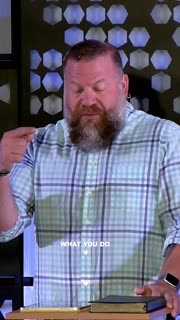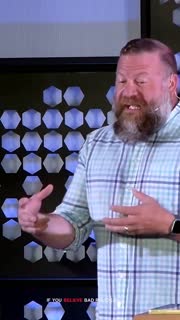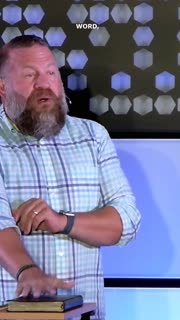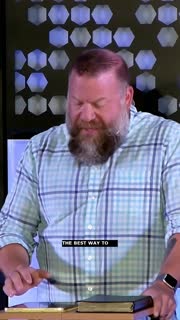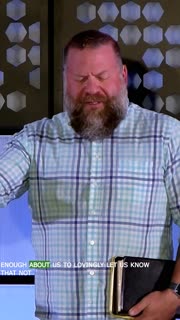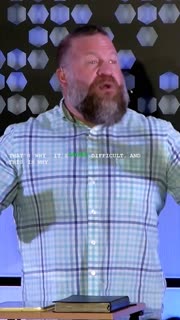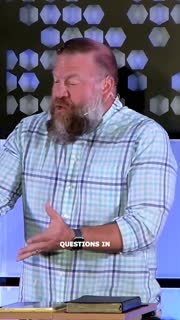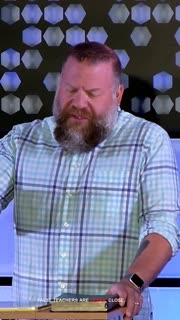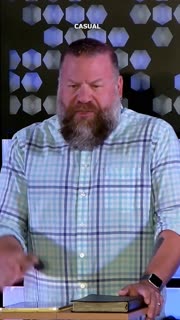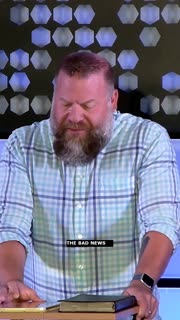Discernment and Truth: Guarding Against False Teachings
Devotional
Sermon Summary
Bible Study Guide
Sermon Clips
### Quotes for Outreach
1. "Until you know what you do believe, you won't know what you shouldn't believe. I don't know if you guys know this, but there's a lot of false information in the world. Did you guys realize this? Of course you did. There's a lot of false information out there. There's false information when it comes to politics, obviously. There's false information when it comes to health, right? And you see one video, and it's like, the best thing you can do is take a nap." [03:23] (36 seconds)
2. "If you believe bad political information, that's going to affect you, but for a small period of time, depending on what laws are passed, right? Like, it's going to affect you for a season. If you believe bad spiritual information, that could affect you for eternity. Do you see the difference? Like, bad political health, all the other information, it's bad. But bad spiritual information hurts forever." [04:42] (30 seconds)
3. "Those that know the Word, those that make it a habit of following Jesus, those who have counted the cost of following Jesus. We're not going to be surprised when we hear these Antichrists. We're going to know and be able to spot them easily. Why? Because false teachers are more deniers of Christ than they are claimers of any truth. More than them claiming something else is true, they deny what Jesus already taught." [10:28] (29 seconds)
4. "The best way to combat a false teacher is to know the truth. Well, how do you know the truth? Well, how do you know the truth? How do we know the truth? Well, a couple of ways. God gives us His truth through Jesus. Didn't Jesus Himself say, you shall find the truth and the truth shall set you free? And He said, I am the way, the truth, and the life." [19:07] (26 seconds)
5. "If we don't know what we do believe, we won't know what we shouldn't believe. Let's pray. God, your word is clear, and I thank you that John cared enough about us to lovingly let us know that not everybody who walks in the doors of a church have proper motives. Some of them are teaching things because they don't know any better. Some of them are teaching false things because they do know better, and they are messengers of our enemy." [31:49] (596 seconds)
### Quotes for Members
1. "That's why it's more difficult, and this is why John writes 1 John, because he wants us to know and to be able to know God. He wants us to be able to prove that we know God, and he does this by giving us different tests, different questions along the way that we can get from the Scripture, and when we ask ourselves these questions, how we answer them helps us determine whether or not we, in fact, know God or not." [01:51] (29 seconds)
2. "If we can answer these questions in the positive, if we can look back and say, you know what? I am growing spiritually. I am loving my neighbor. I am obeying God's commands. Then that is proof that we, in fact, know God, because we have to know God to be able to do those things, but if we look back at those questions and we say, I really don't know. I don't know if I'm growing spiritually. I don't know if I'm loving my neighbor the way I should." [02:39] (24 seconds)
3. "False teachers are clear, close, confined, and confused. Okay? We're going to go through each one of those. Number one, false teachers are clear. The Bible is very clear that in the end, towards the end, there is a person who rises up to oppose Jesus more than anyone has ever opposed Jesus, and that is the Antichrist. He is a real person. He is a very real person, and he literally could come at any time. The Bible's pretty clear about that." [09:33] (30 seconds)
4. "The casual Christian is the one who should be afraid of the Antichrists because they're not going to know that what they're teaching is false. The casual Christian that just comes to church when it's convenient for them and would claim that they're a Christian, but when you look at their life, there's no fruit coming from their relationship with Jesus. That person is the one that's going to be shocked and surprised by these Antichrists." [10:28] (27 seconds)
5. "The bad news was that these false teachers were very real, very toxic, and very close. The good news was that false teachers have limited power. Their influence is confined, and it has no power over believers, none. And why? Why is that? Well, because God gives us protection against false teachers. As believers in Christ, God protects us against false teachers." [17:35] (28 seconds)
Ask a question about this sermon
1. "Until you know what you do believe, you won't know what you shouldn't believe. I don't know if you guys know this, but there's a lot of false information in the world. Did you guys realize this? Of course you did. There's a lot of false information out there. There's false information when it comes to politics, obviously. There's false information when it comes to health, right? And you see one video, and it's like, the best thing you can do is take a nap." [03:23] (36 seconds)
2. "If you believe bad political information, that's going to affect you, but for a small period of time, depending on what laws are passed, right? Like, it's going to affect you for a season. If you believe bad spiritual information, that could affect you for eternity. Do you see the difference? Like, bad political health, all the other information, it's bad. But bad spiritual information hurts forever." [04:42] (30 seconds)
3. "Those that know the Word, those that make it a habit of following Jesus, those who have counted the cost of following Jesus. We're not going to be surprised when we hear these Antichrists. We're going to know and be able to spot them easily. Why? Because false teachers are more deniers of Christ than they are claimers of any truth. More than them claiming something else is true, they deny what Jesus already taught." [10:28] (29 seconds)
4. "The best way to combat a false teacher is to know the truth. Well, how do you know the truth? Well, how do you know the truth? How do we know the truth? Well, a couple of ways. God gives us His truth through Jesus. Didn't Jesus Himself say, you shall find the truth and the truth shall set you free? And He said, I am the way, the truth, and the life." [19:07] (26 seconds)
5. "If we don't know what we do believe, we won't know what we shouldn't believe. Let's pray. God, your word is clear, and I thank you that John cared enough about us to lovingly let us know that not everybody who walks in the doors of a church have proper motives. Some of them are teaching things because they don't know any better. Some of them are teaching false things because they do know better, and they are messengers of our enemy." [31:49] (596 seconds)
### Quotes for Members
1. "That's why it's more difficult, and this is why John writes 1 John, because he wants us to know and to be able to know God. He wants us to be able to prove that we know God, and he does this by giving us different tests, different questions along the way that we can get from the Scripture, and when we ask ourselves these questions, how we answer them helps us determine whether or not we, in fact, know God or not." [01:51] (29 seconds)
2. "If we can answer these questions in the positive, if we can look back and say, you know what? I am growing spiritually. I am loving my neighbor. I am obeying God's commands. Then that is proof that we, in fact, know God, because we have to know God to be able to do those things, but if we look back at those questions and we say, I really don't know. I don't know if I'm growing spiritually. I don't know if I'm loving my neighbor the way I should." [02:39] (24 seconds)
3. "False teachers are clear, close, confined, and confused. Okay? We're going to go through each one of those. Number one, false teachers are clear. The Bible is very clear that in the end, towards the end, there is a person who rises up to oppose Jesus more than anyone has ever opposed Jesus, and that is the Antichrist. He is a real person. He is a very real person, and he literally could come at any time. The Bible's pretty clear about that." [09:33] (30 seconds)
4. "The casual Christian is the one who should be afraid of the Antichrists because they're not going to know that what they're teaching is false. The casual Christian that just comes to church when it's convenient for them and would claim that they're a Christian, but when you look at their life, there's no fruit coming from their relationship with Jesus. That person is the one that's going to be shocked and surprised by these Antichrists." [10:28] (27 seconds)
5. "The bad news was that these false teachers were very real, very toxic, and very close. The good news was that false teachers have limited power. Their influence is confined, and it has no power over believers, none. And why? Why is that? Well, because God gives us protection against false teachers. As believers in Christ, God protects us against false teachers." [17:35] (28 seconds)
